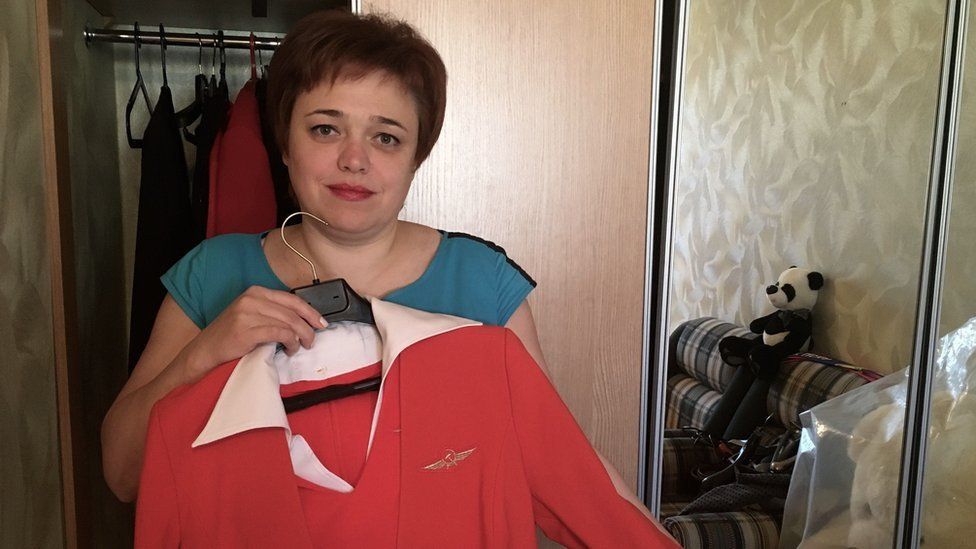'Too fat to fly': Russian women fight job discrimination
- Published

For Aeroflot it was an attempt at an image makeover that went wrong.
When Russia's national airline decided to link the pay of its flight attendants to their dress size, Evgenia Magurina was outraged.
"I was in shock at first. It didn't make sense. How could they cut pay, because of your size?" the stewardess recalls at her Moscow flat, close to the airport. "They said the 'success' of a stewardess depends on her size, and that really offended me," she says, pointing out that she had seven years' experience at the airline.
Aeroflot strenuously denies discrimination. But its approach seems particularly odd in Russia, 100 years after a revolution which prided itself on promoting equality.
Last year, cabin crew at the airline were measured and photographed. Evgenia Magurina says she was told she had "big cheeks and a big bust" and should wear a sports bra.
Then in October she noticed that her bonus pay had been docked. She had also been removed from more lucrative, long-haul flights.
More from Sarah Rainsford:
When she confronted her bosses she was told she didn't meet the size limit Aeroflot had set for its cabin crew: a Russian size 48, about a UK 14 or US 12.
Evgenia Magurina says hundreds of other flight attendants suffered the same treatment, dubbing themselves the STS club after the Russian words for old, fat and ugly.
Instead of long trips to New York, they joked that they had been relegated to night flights around the Russian city of Nizhny Novgorod, "so no-one will see us".
Facing a cut of some 30% in her pay, Evgenia Magurina decided to sue.
"They put appearance in first place. But stewardesses are rescuers above all," she insists. "Imagine if they had the same requirements for judges or doctors? It would be absurd."
Russian women got the vote in 1917; abortion was legalised soon after. And in a hugely symbolic move, the USSR sent the first female cosmonaut Valentina Tereshkova into space.
But years on, flight attendants aren't the only women facing discrimination here.
In the central Russian city of Samara, Svetlana Medvedeva has been barred from a job captaining a boat.
In 2012, she was hired as a boat pilot and mechanic but the offer was withdrawn when the firm's HR department intervened. It realised it could not employ her because she was female.
In fact, 456 professions are off limits for women in Russia, labelled as dangerous or supposedly harmful to their reproductive health. That includes driving a train, fighting fires or working as a carpenter.
"I'd understand if they were really worried about pregnant women, but they don't even consider whether a woman is pregnant, or plans to be," Svetlana Medvedeva points out on a small motor boat on the wide, choppy river Volga. As we talk, a long, low passenger ferry sails past - the boat she was barred from working on.
Svetlana Medvedeva has been disputing that decision through the courts ever since.
"Russia is a patriarchal country. Any movement on women's rights is backwards," she argues. "This list of professions speaks for itself."
Introduced in 1974, the list was confirmed in 2000 and allows exceptions only if an employer can prove they have made conditions safe - specifically for women. In practice, few want the hassle or cost of proving that.
"I don't know a single [piece of] research that supports this idea of protecting women by forbidding professions. I don't think this is the reason," says historian Irina Roldugina from the Higher School of Economics.
She points out that the list came just as a new generation of post-Soviet women were finding their independent feet.
"Women started to see themselves as fully fledged citizens, and this was seen as a problem," Irina Roldugina argues.
In February 2016, the UN's anti-discrimination body ruled that Svetlana Medvedeva had been denied work unfairly on the basis of her gender.
The Committee on the Elimination of Discrimination against Women (CEDAW) says Russia has a "moral obligation" to implement its recommendation to revise the jobs list, but admits that is not legally binding.
'Justice prevails'
The Supreme Court did order Svetlana Medvedeva's case re-opened though and this week a judge in Samara is expected to reach a verdict.
Meanwhile back in Moscow, Evgenia Magurina has already had her day in court.
Aeroflot's lawyers attempted to defend the cut in her bonus pay by arguing that every extra kilo of weight cost the airline more in fuel. They also claimed their policy was based on narrow plane corridors and its crews' health, not purely their appearance.
But the judge declared the airline's pay policy illegal, leaving Evgenia Magurina hugging her friends and lawyers in tears of disbelief.
"I hope this means women will be braver in fighting for their rights," she said, recalling one friend who made herself sick starving herself to reach the airline's size limit.
"They thought everyone would put up with it. But it offended us," she says. "Now justice has prevailed."
- Published20 April 2017
- Published13 August 2017